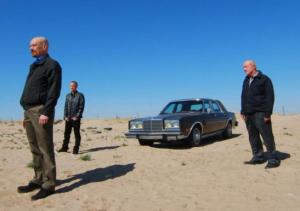 Eric Jett has already explained what he thinks is wrong with Breaking Bad: what it’s doing to its fans. The show, he claims, has “turned its fans into some of the worst people on the internet.” He examines a set of vocal, loyal viewers who identify with and take pleasure in Walter’s toxic narcissism, who openly (and misogynistically) condemn Skyler (the show’s most interesting and important character), and who, in general, seem to be engaged for all the wrong reasons. It’s an ugly sight.
Eric Jett has already explained what he thinks is wrong with Breaking Bad: what it’s doing to its fans. The show, he claims, has “turned its fans into some of the worst people on the internet.” He examines a set of vocal, loyal viewers who identify with and take pleasure in Walter’s toxic narcissism, who openly (and misogynistically) condemn Skyler (the show’s most interesting and important character), and who, in general, seem to be engaged for all the wrong reasons. It’s an ugly sight.
But it’s not surprising that a show with a powerful white male as its protagonist appeals to the conservative values of masculinity, misogyny, individualism, and authority. And it’s not surprising that some people enjoy seeing a story that, at least on the surface, glorifies and promotes these values. That fans are identifying with Walter White in a way that they didn’t with, say, Tony Soprano (that other famous deeply insecure, rule breaking and intolerant power monger) is a testament to the growth and proliferation of online fan communities as well as the expansion of fear (and the accompanying conservatism) that come about when times are tough. If the incidence of prayer increases in societies where things are harder (and it does), then it’s easy to expect a mass of viewers who, feeling disenfranchised and uncertain, find a sense of relief in witnessing Walter White exercise his dominance.
What is comforting, I think, is the possibility that Breaking Bad is doing much more than chronicling one underdog’s rise to (and subsequent fall from) power. By the time the show ends, the folks who’ve been watching simply to revel in Walt’s cool new car or his latest show of force or contempt for others will, quite possibly, feel confused, excluded, and let down. And that’s a good thing.
I’m trusting that the show is less about one man and his family and more about the inherent interconnectedness of our world — that it is less interested in its characters’ actions themselves than in their far-reaching consequences.
Sure, the show has referenced string theory, has made a copy of Leaves of Grass (from which Gale recites) central to the development of its plot, and has gone as far as to show Walter enjoying Scarface — a move that, forced and awkward as it was, seemed to be a way of responding to and resetting audience expectations.
It also framed its entire second season inside the wreckage of an airplane whose crash Walt’s actions helped bring to fruition. If our real world is a place where people are so often indifferent to each other and the results of their own actions, Breaking Bad depicts a world in which what people do really matters.
Aside from that, it has some of the best montages — a technique which itself highlights the cobbling together of disparate elements in order to enhance their significance. The prison-murder montage in the most recent episode is unforgettable and goes a long way toward convincing me that what we’ve seen so far is only the beginning. As Walt takes his business international, as the camera glides over all the tarp-covered homes in which he’s cooked, it becomes clear that the show is beginning, more seriously and consistently, to depict the large-scale results of Walt’s actions. And they aren’t pretty.
If the show does conclude by focusing on the far-reaching misery Walt has helped spread (as I hope and suspect it will), then Walter’s hubris and stubbornness won’t remain the objects of adoration they currently are for some. In the face of such misery, even Walt’s most enthusiastic and misguided fans might have to re-examine their reverence. If the show does this, and if it manages to end by doing more than simply punishing Walt for his misdeeds, then it might become more than just “an FX show with a nice camera and a few good actors.” It could be something that, like all good art, pushes us to consider how our lives intersect and give meaning to one another.
This post may contain affiliate links.








